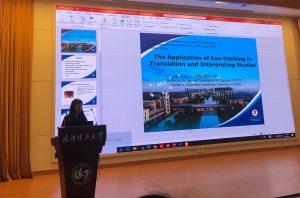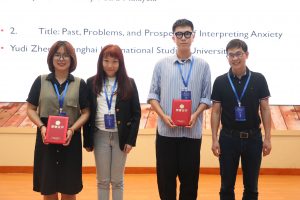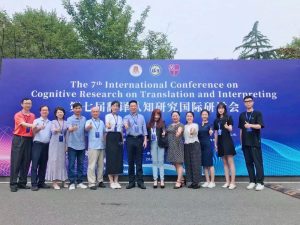 The Centre for the Studies of Translation, Interpreting and Cognition (CSTIC) of the University of Macau (UM) Faculty of Arts and Humanities (FAH), the School of Foreign Languages of Wuhan University Of Technology, and Centre for Intercultural Mediation (CIM) of Durham University recently co-organised the seventh edition of the International Conference on Cognitive Research in Translation and Interpreting from June 11th to June 13th in Wuhan. This year’s conference attracted more than 240 experts, scholars and young talents from abroad such as Germany, the UK, Canada and Poland, as well as representatives of teachers and students from mainland China and the Macao Special Administrative Region.
The Centre for the Studies of Translation, Interpreting and Cognition (CSTIC) of the University of Macau (UM) Faculty of Arts and Humanities (FAH), the School of Foreign Languages of Wuhan University Of Technology, and Centre for Intercultural Mediation (CIM) of Durham University recently co-organised the seventh edition of the International Conference on Cognitive Research in Translation and Interpreting from June 11th to June 13th in Wuhan. This year’s conference attracted more than 240 experts, scholars and young talents from abroad such as Germany, the UK, Canada and Poland, as well as representatives of teachers and students from mainland China and the Macao Special Administrative Region.
On 11th June, Prof. Vitoria Lai Cheng Lei from the CSTIC introduced eye-tracking techniques in interpreting and translation studies at the pre-conference workshop.

At the opening ceremony, Prof Li Defeng from the CSTIC stressed that in order to understand how the brains of translators and interpreters work, cooperation among different research teams around the world is essential.

According to Prof. Li Defeng the cognitive research of translation has received more and more attention worldwide; researchers have conducted experiments from different perspectives such as psycholinguistics and behavioral linguistics by using various tools like eye tracker, EEG and MRI, and many research results have been applied into our daily life. At the same time, translation cognitive research also faces a number of theoretical and methodological challenges. Prof. Li Defeng emphasized that the conference had received about 200 research papers, which proved it was a high level and influential academic event. He believed that the conference would further promote the development of translation cognitive research.
During the conference, the CSTIC research team leading by Prof Li Defeng and Prof Victoria Lei presented 5 papers on the results of innovative studies about the cognitive processes of translation and interpreting, among which one team member LI Guanji got the Best Paper Award of Special Award.

At the closing ceremony, Professor Zheng Binghan, Director of the Centre for Intercultural Studies, Durham University (UK) expressed his gratitude to the participants, affirmed the achievements of the participating scholars in translation theory and teaching research, and highly valued the academic quality, solid theoretical foundation and innovative thinking of young scholars.


